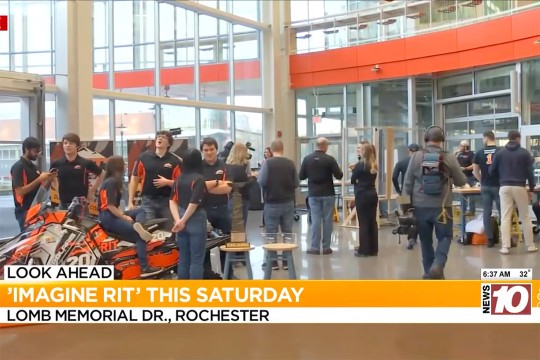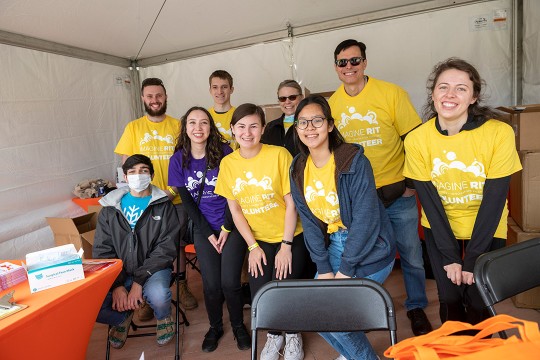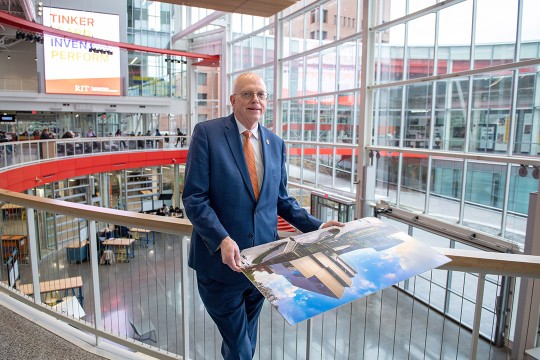RIT Environmental Lab Announces New Green Transportation Initiative
Advances in freight transportation will enhance environmental performance of global economy
The Laboratory for Environmental Computing and Decision Making (LECDM) at Rochester Institute of Technology has announced a new program aimed at exploring the environmental, economic and energy impacts of global and domestic freight transportation. The Sustainable Freight Transportation Research Initiative (SFTRI) will help build tools and conduct research necessary for improving the environmental footprint from moving goods around the globe.
“Freight transportation is an important piece of the whole transportation puzzle and one that has been frequently ignored in environmental and policy research,” says James Winebrake, RIT chair/professor of science and technology, and co-director of LECDM.
“We are very interested in better understanding how our freight transportation choices—whether truck, rail, ship, air or a combination of these modes—affect the overall environmental performance of our economy,” explains Winebrake, who is an international expert in freight transportation.
According to J. Scott Hawker, co-director of LECDM and assistant professor in software engineering at RIT’s B. Thomas Golisano College of Computing and Information Sciences, “This initiative expands our existing suite of transportation and sustainable supply chain research projects to include sustainability of freight movement. Through SFTRI, we will apply novel computing technology and environmental informatics to explore the environmental problems associated with goods movement in this country.”
LECDM is currently working on several projects that fall under the freight initiative. One is developing a Geospatial Intermodal Freight Transportation (GIFT) tool that allows shippers and policymakers to identify the easiest ways to move freight throughout the country. The mapping tool allows for the analysis of moving goods from origin to destination and can identify the “greenest” routes, as well as the fastest and least expensive routes. This tool has received development funding from federal and state government and has drawn the attention of a variety of industries looking to improve the environmental performance of their supply chains.
The initiative will also link with other programs within LECDM, including a $2 million project with the National Science Foundation to explore the impact of greenhouse gas policies on automotive technology and markets, as well as research looking at the environmental impacts of industrial supply chains from a life-cycle analysis perspective.
Sandra Rothenberg, associate professor of management at RIT’s E. Philip Saunders College of Business and a faculty associate of the LECDM, says, “This initiative and the research that it will spawn will give us the tools we need to improve the environmental and economic performance of global supply chains. Given the many environmental problems we face, from global warming to toxic pollution, this initiative will play an important role in identifying solutions.”
LECDM combines multiple disciplines and perspectives on freight movement and associated environmental, economic and policy concerns. Faculty associates include members from RIT’s Kate Gleason College of Engineering, Saunders College of Business, B. Thomas Golisano College of Computing and Information Sciences, College of Liberal Arts, College of Science, Golisano Institute for Sustainability, and the College of Applied Science and Technology. LECDM also has relationships with researchers at the University of Delaware, University of Michigan, University of California at Berkeley, University of California at Davis and Northeastern University.
“We are excited that this strong group of researchers has committed to work together to address the important problems of sustainable freight transportation,” says Hawker. “The Sustainable Freight Transportation Research Initiative provides a framework for scholarship that will help industry and government make the right decisions for both the economy and the environment.”
EDITOR’S NOTE: For more information, contact the RIT LECDM co-directors: James Winebrake at jwinebrake@mail.rit.edu, or J. Scott Hawker at hawker@mail.rit.edu.














